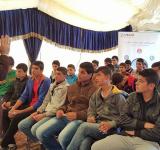The Jordan Compact: Lessons learnt and implications for future refugee compacts
This policy briefing gives a background on the creation of the Jordan Compact and analyzes its strengths and weaknesses. With the Jordan Compact,Jordan committed to improving access to education and legal employment for its Syrian refugees in return for billions of dollars in grants and loans and preferential trade agreements with the European Union (EU). Considerable progress has been made in Jordan: more Syrians are now in education and formal employment. Yet,unsurprisingly given the speed with which the Compact was designed and rolled out,challenges remain in ensuring widespread access to quality education,sustainable livelihood opportunities,and securing tangible improvements in the daily lives of Syrian refugees. Progress in expanding access to work in industrial zones has been slow. Progress has been made in work permits issued,but critical sectors and self-employment remain closed to refugees. Labour market participation of women is also lagging behind compared to men as many women are unable to work because of social and practical constraints. Thus,the objective of this briefing was to analyze the relative success of the Jordan Compact,provide suggestions for the future of this compact and for the creation of other future refugee contracts.
